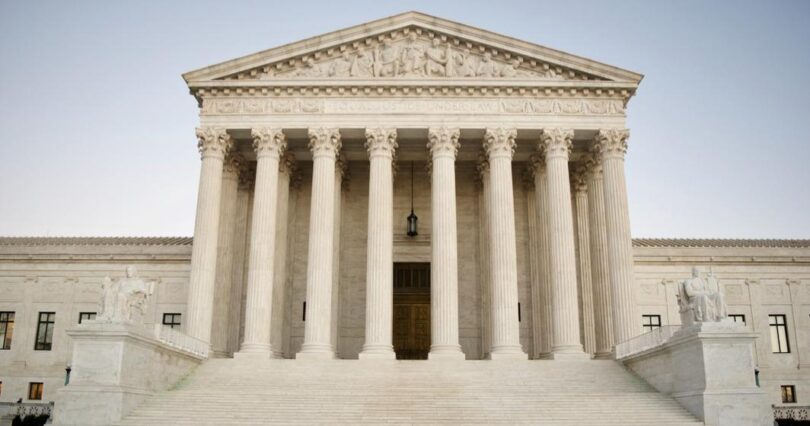Supreme Court Issues Rare Update to Schedule, Could Rule on Trump Ballot Case the Day Before Super Tuesday
The U.S. Supreme Court could issue a ruling on March 4 regarding the attempt to bar former President Donald Trump from appearing on primary and general election ballots for the 2024 presidential election.
The Supreme Court updated its schedule on Sunday, a rare move for the court, without specifying what ruling it would issue at the March 4 meeting. However, the justices on Feb. 8 heard arguments in the former president’s appeal of the Colorado ruling that barred former President Trump from the ballot in the state. The court is due to issue its own decision in the near future.
Additionally, the newly announced meeting would take place the day before Super Tuesday, the day that both Colorado and Maine, another state that barred the former president from the ballot, are set to have their GOP primaries.
The March 3 announcement said the opinion would be posted online at 10 a.m. Washington time. “The court will not take the bench,” it only said on its website.
Late last year, the Colorado Supreme Court ruled that Trump would be disqualified from appearing on ballots in the state, citing an interpretation of the 14th Amendment which stipulates that candidates who engaged in an “insurrection or rebellion” against the United States should be prevented from holding office.
Days later, Maine’s Democratic Secretary of State Shenna Bellows made a similar decision, and in the past week, a judge in Illinois issued a ruling preventing his appearance on ballots.
The amendment was drafted in the immediate wake of the Civil War, and the court was the first to invoke it.
However, all three of the above rulings are on hold ahead of the Supreme Court decision on the matter. The court indicated that at least one case would be decided on March 4, without indicating which one.
The Supreme Court has never ruled on the provision in Section 3 of the 14th Amendment before.
If the Trump case is being ruled on, it would come one day before Super Tuesday primary contests in 16 states, often considered the largest primary date, and would remove any uncertainty about whether votes for Trump, the dominant leader for the Republican nomination, will count.
Justices for the Colorado Supreme Court argued that they believed that Trump had engaged in an insurrection due to his actions prior to and on the day of the Jan. 6, 2021, Capitol incident.
However, the former president has not been charged or convicted of insurrection. He was charged by a federal special counsel in connection with the 2020 election, but not for insurrection, rebellion or related charges.
“President Trump asks us to hold that Section Three disqualifies every oath-breaking insurrectionist except the most powerful one and that it bars oath-breakers from virtually every office, both state and federal, except the highest one in the land,” the majority for the Colorado Supreme Court wrote in its 4–3 ruling. “Both results are inconsistent with the plain language and history of Section Three.”
Six of the nine justices on the Supreme Court have cast doubt on claims made by lawyers representing the Colorado voters who brought the challenge to the Colorado Supreme Court.
“It’ll come down to just a handful of states that are going to decide the presidential election,” Chief Justice Roberts said, referring to the potential effect of the Colorado court’s ruling. “That’s a pretty daunting consequence.”
Justice Clarence Thomas asked the lawyer Jason Murray why there weren’t many examples of individual states’ disqualifying candidates under the 14th Amendment after the Civil War.
“There were a plethora of confederates still around, there were any number of people who would continue to either run for state offices or national offices, so it would seem — that would suggest there would at least be a few examples of national candidates being disqualified,” said Thomas.
Justice Elena Kagan, a member of the court’s more liberal wing, asked the attorney why one state should have the power to determine which candidates should be on the ballot at a national level.
“Why should a single state have the ability to make this determination not only for their own citizens but also for the nation?” she asked the attorney, adding the move would be “quite extraordinary.”


Leave a Comment